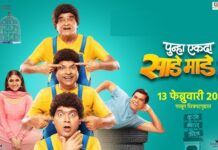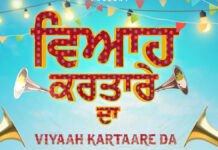Yash Raj Films’ Shuddh Desi Romance (UA) is about the commitment-phobic youth of modern India. Raghuram alias Raghu (Sushant Singh Rajput) is a tourist guide in Jaipur, who also doubles up as a paid guest (baraati) in marriages as and when wedding caterer Goyal (Rishi Kapoor) requests him to do so.
Raghu is to be married to Taara (newfind Vaani Kapoor) but develops cold feet when he is going to the bride’s town along with baraatis in a bus. Accompanying Raghu is Goyal and some paid guests including the English-speaking Gayatri (Parineeti Chopra). Raghu strikes up a friendship with Gayatri and before reaching the destination, falls in love with her in spite of being told by her that she has had love affairs in the past. On the wedding day, Raghu ditches Taara and runs away.
Soon, Raghu and Gayatri have a live-in relationship as she also falls in love with him. The two decide to get married and even as Raghu is once again wondering whether he is taking the right step, Gayatri ditches him and runs away from the marriage.
Days pass. Suddenly, one day, Raghu meets Taara at the marriage of her brother, to attend which he has come as a paid guest. Sensing Raghu’s awkwardness, Taara makes the first move to meet him. The two are civil with each other and before long, they fall in love with one another. At yet another marriage, Raghu and Taara are shocked to meet Gayatri. So now, there are three of them thrown together with Raghu sandwiched between Gayatri and Taara.
What happens thereafter? Do sparks fly between Raghu and Gayatri? Is Raghu willing to forgive Gayatri? Why had Gayatri run away on her wedding day? Do Gayatri and Taara confront each other? Are they hand-in-glove with one another? Does Raghu marry Gayatri or Taara or none of them?
Jaideep Sahni’s story is very unusual and shows the youngsters as being fearful of commitment in matters of marriage. Their fickle-mindedness is underlined. The screenplay is too simplistic and relies heavily on coincidences. For instance, Raghu meets Taara after he has ditched her, by sheer coincidence; he also meets Gayatri after their breakup, by sheer chance. As coincidence would have it, the three come face to face so easily. Again, by sheer coincidence, Raghu and Gayatri are both so very commitment-phobic.
While the youngsters would be able to identify with the fear of commitment in matters of marriage, there would be an entire older generation which would find the commitment phobia too difficult to digest.
As far as the first half is concerned, the film entertains for a good part of it because the characters of Raghu and Gayatri are very refreshing and endearing. Also, the whole ambience of Rajasthani weddings and the angle of paid guests at weddings have been beautifully brought out. The light banter between Raghu and Gayatri as also the pearls of wisdom of caterer Goyal make for interesting viewing.
The second half gets repetitive once Taara comes on the scene again. Her forgiving nature looks like a convenient twist as writer Jaideep Sahni has not been able to justify why she forgives Raghu so fast and so easily. The drama seems to meander once Gayatri re-emerges on the scene even as Raghu and Taara are trying to come closer to one another.
The older generation would have a problem with the characters of both, Gayatri and Taara, because both the girls have been shown to be ready to sleep with Raghu at what appears to be the drop of a hat! Also, the older generation would find the story too far-fetched and often implausible. But these problems will not even appear as problems to a fairly large section of the city youth which this film targets. The climax may go well with the theme of the film but it will leave a section of the audience dissatisfied. Having said this, it must be added that the younger generation would not mind the climax and may, in fact, view it as a fine culmination for liberated minds.
Jaideep Sahni’s dialogues are very earthy and laced with a lot of humour.
Sushant Singh Rajput is wonderfully natural and endearing. He lives the character of Raghu and plays the commitment-phobic youngster with admirable ease. Young girls are bound to be bowled over by his charisma. Parineeti Chopra is also extraordinarily real. Her acting is effortless and she uses her expressions brilliantly to convey her emotions. Vaani Kapoor makes a confident debut in spite of her character being a bit sketchy and ill-defined. Rishi Kapoor is outstanding and leaves a mark every time he appears on the screen. Rajesh Sharma makes his presence felt in a small role as Mausaji. Tarun Vyas (as Gupta), Jasbir Jassi (as the paanwallah), Tripti Sharma (as the bride in the climax), Imitiaz Ahmed (as the electrician-boyfriend of the bride), Craig and Alex (as foreign tourists) and Bhuvan Arora, Amit Mahoday, Pratik Jaiswal and Anuj Pandit (all four as Raghu’s friends) are all effective in their roles.
Maneesh Sharma’s direction does justice to the bold script. His narrative style, like the script, will appeal to the youth. Sachin-Jigar’s music is good. ‘Tere mere beech mein’, ‘Gulabi’, ‘Ati random’, the title track and a couple of other songs are appealing. Jaideep Sahni’s lyrics are wonderful. Song picturisations (by Brinda and Ganesh Acharya) are appropriate. Background music (by Sachin-Jigar) is very nice. Manu Anand’s cinematography is lovely, capturing the essence of Rajasthan locales beautifully. Rashmi Sethi’s sets and settings are authentic. Namrata Rao’s editing is sharp.
On the whole, Shuddh Desi Romance will meet with a mixed response. While the youth and the city audience will enjoy the unusual drama, the more orthodox and small-town audience will find it too different and bold for their liking. In commercial terms, the moderately-priced film will prove to be a comfortable earner on the strength of the youth patronage and business in the cities and multiplexes.
Released on 6-9-’13 at Regal (daily 3 shows), Eros (daily 1 show), New Excelsior (daily 1 show) and other cinemas of Bombay by Yash Raj Film Distributors. Publicity: excellent. Opening: very good. …….Also released all over. Opening was very good in the multiplexes, even excellent at several centres.




























